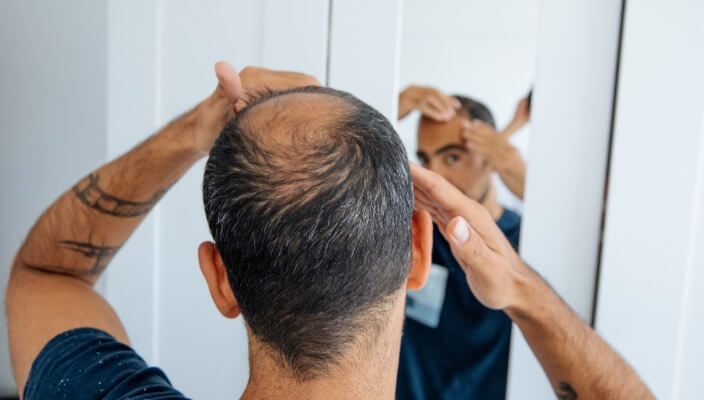The Connection Between Autoimmune Diseases and Alopecia
 Living with chronic hair loss can be frustrating and emotionally challenging. Alopecia, a condition known for causing varying degrees of hair loss, often leaves those affected searching for answers. What many people don’t realize is that alopecia is often more than just a cosmetic issue. It can be deeply tied to autoimmune diseases, conditions where the body's immune system mistakenly attacks its own tissues. In many cases, these attacks result in inflammation, swelling, and even hair loss. Understanding the link between autoimmune diseases and alopecia is crucial for managing both conditions effectively.
Living with chronic hair loss can be frustrating and emotionally challenging. Alopecia, a condition known for causing varying degrees of hair loss, often leaves those affected searching for answers. What many people don’t realize is that alopecia is often more than just a cosmetic issue. It can be deeply tied to autoimmune diseases, conditions where the body's immune system mistakenly attacks its own tissues. In many cases, these attacks result in inflammation, swelling, and even hair loss. Understanding the link between autoimmune diseases and alopecia is crucial for managing both conditions effectively.
How Autoimmune Diseases Contribute to Hair Loss
Autoimmune diseases are complex. When the immune system malfunctions, it can mistake healthy cells, such as those in the hair follicles, for foreign invaders and launch an attack. This immune dysfunction disrupts the normal hair growth cycle, making it difficult for hair follicles to function properly. Over time, this can result in hair thinning or more severe forms of hair loss. The degree of hair loss varies depending on the underlying autoimmune condition and how aggressively the immune system behaves at any given time.
Autoimmune Diseases Commonly Linked to Alopecia
Alopecia Areata
Thyroid Disorders
Lupus
Other Autoimmune Diseases That Can Lead to Hair Loss
In addition to the well-known autoimmune conditions mentioned above, several other diseases can also contribute to hair loss.
Rheumatoid Arthritis (RA)
Although RA is primarily known for causing joint inflammation, it can also lead to hair loss. In some cases, the hair loss results from the medications used to control the disease. Drugs like methotrexate, commonly prescribed for RA, can have side effects that include thinning hair.
Psoriasis
Psoriasis, another autoimmune condition that primarily affects the skin, can also cause hair loss. When psoriasis occurs on the scalp, the inflammation and buildup of skin cells can interfere with hair follicles, resulting in shedding and thinning of the hair.
Treating Autoimmune-Related Alopecia
While dealing with autoimmune-related alopecia can be overwhelming, several treatment options are available to help manage both hair loss and the underlying autoimmune condition. The best course of treatment often depends on the specific disease and severity of symptoms.
Thyroid Hormone Replacement
For those with thyroid-related alopecia, hormone replacement therapy can help regulate the thyroid gland and, in turn, promote healthier hair growth. Balancing hormone levels may help reverse the hair loss caused by an overactive or underactive thyroid.
Corticosteroids
Corticosteroids are commonly prescribed to reduce inflammation and suppress the immune system's activity. By calming the immune response, corticosteroids can minimize damage to hair follicles, allowing hair to regrow. However, these drugs are typically used on a short-term basis due to their potential side effects.
Immunotherapy
In some cases, immunotherapy may be recommended to treat autoimmune-related alopecia. This type of therapy helps regulate the immune system and prevent it from attacking the body's tissues, including hair follicles. Immunotherapy is often used when traditional medications like corticosteroids fail to provide relief.
Lifestyle Adjustments
Managing autoimmune-related alopecia isn't just about medical treatments—lifestyle changes can also play a critical role. Eating a balanced diet, reducing stress, and staying physically active are all essential for maintaining overall health and minimizing autoimmune flare-ups. Avoiding highly processed foods and managing stress can help prevent the immune system from becoming overactive, which may reduce the risk of hair loss.
How a Dermatologist Can Help with Autoimmune-Related Alopecia
If you are experiencing hair loss due to an autoimmune condition, consulting with a dermatologist is crucial. Dermatologists diagnose and treat various skin, hair, and scalp conditions, including alopecia linked to autoimmune diseases. Their expertise can provide you with an accurate diagnosis and recommend effective treatments tailored to your specific needs.
Dermatologists can offer a range of treatments for autoimmune-related alopecia, such as corticosteroid injections to reduce inflammation, topical treatments to stimulate hair growth, and other advanced therapies like immunotherapy. They can also help monitor your progress and adjust your treatment plan as needed to optimize results. Additionally, dermatologists can offer guidance on managing scalp health and preventing further damage to hair follicles.

Tru-Skin Dermatology Can Help You Face The World With Confidence
If you're dealing with hair loss, seeking professional advice from a dermatologist can make a significant difference. Their expertise in managing autoimmune-related conditions will help you regain control and work toward healthier hair. Schedule an appointment with Tru Skin Dermatology today to explore your treatment options.
Related Blogs

- General Dermatology
Your skincare routine is not just about what you apply to your skin. It’s also about what you eat.
Read More
- Skin Cancer
- General Dermatology
- Cosmetic Treatments
At Tru-Skin Dermatology, we offer a wide range of common dermatology procedures to patients throughout Austin, TX, and the surrounding areas. Read this blog to learn more about how we can help you achieve your skin goals.
Read More
- General Dermatology
Read this blog to learn more about the causes of hair loss and the many treatment options offered at Tru-Skin Dermatology.
Read MoreFeatured Products for Hair Loss
Check your local office for current stock!
Check your local office for current stock!



